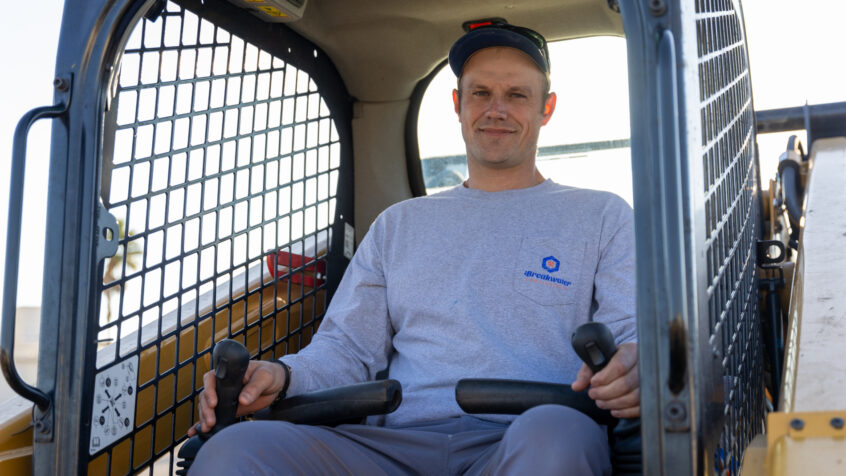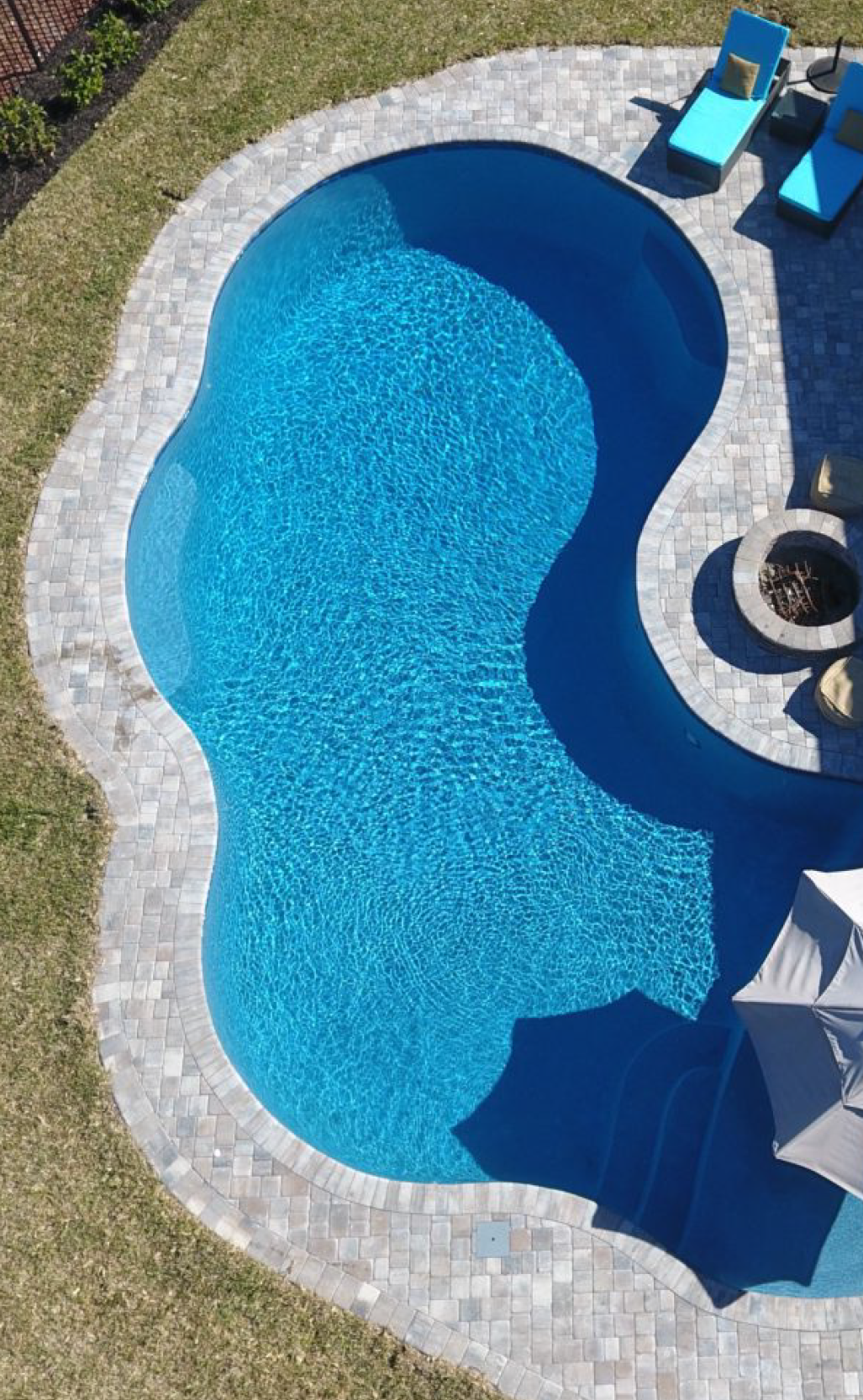When planning a pool installation in St. Johns County, understanding the different shell types available becomes crucial for making an informed decision. Pool contractors work with three primary construction methods: fiberglass, vinyl liner, and concrete (also called gunite or shotcrete). Each offers distinct advantages and considerations that directly impact your long-term investment.
The choice between these shell types affects everything from installation timeline to maintenance requirements. Each offers its own unique advantages and drawbacks, which means there’s no “best” option — only what’s best for you. Understanding these differences helps you select the right foundation for your backyard oasis.
Fiberglass Pool Shells: Factory-Built Durability
Fiberglass pools represent a modern approach to pool construction that has gained significant popularity in Florida. These pools are built by manufacturers in climate-controlled manufacturing facilities.
Construction Process and Benefits
Fiberglass pool shells are manufactured in severy different locations across the county.. The manufacturing process creates a one-piece shell that arrives at your property ready for installation. Because your pool is delivered to your jobsite complete, pool contractors can often install fiberglass pools faster than other types of inground swimming pools.
Maintenance Considerations
The interior gelcoat finish of the fiberglass pool is non-porous and does not react with the water. Algae, bacteria, and other contaminants do not stick to the surface of the pool, resulting in less chemicals to keep the water clear.
The interior finish of today’s fiberglass pools won’t deteriorate, fade, or break down over time. Fiberglass pools will never require a renovation due to the pool shell or the pool interior finish breaking down, wearing out, or otherwise falling apart.
Florida Climate Compatibility
Fiberglass pools are an excellent choice for Florida, as the native ground conditions in Florida tend to be very sandy, and it is common to have water moving through the soil close to ground level. Not only are fiberglass pools compatible with Florida’s climate, they also offer some potential advantages over gunite, concrete, or vinyl liner alternatives, including superior strength, durability, and resistance against wear and tear.
For homeowners in St. Johns County seeking a fast construction timeline and are ok with somewhat limited customization options, fiberglass offers a compelling solution.
Concrete Pool Shells: Maximum Customization
Concrete pools, often referred to as gunite or shotcrete pools, remain popular in St. Johns County and throughout Florida for their unlimited design flexibility. The most popular type of swimming pool for Florida is a concrete or gunite construction. These pools offer homeowners the ability to create truly custom designs that complement their specific property and lifestyle needs.
Construction Methods
Gunite is a dry concrete mix that combines with water as it’s sprayed, while shotcrete is wet concrete that’s pre-mixed before spraying. Both create a strong, durable pool shell, but gunite is more commonly used for custom designs.
Design Advantages
Concrete pools offer a level of customization that is simply unmatched. Whether you have a specific shape, size, or design in mind, concrete allows for virtually limitless possibilities. This flexibility makes concrete pools ideal for properties with unique layouts or homeowners seeking specific aesthetic features. This flexibility in design also makes it possible for more families in communities like Nocatee, St. Augustine, and Ponte Vedra with smaller yards to realize their dream of having a beautiful pool in their own backyard! For those considering financing, Breakwater offersflexible pool financing options to make the process easier.
Long-term Considerations
Concrete pools generally require a larger upfront investment than vinyl liner pools, and similar upfront costs to fiberglass pools. The installation times are often longer than fibgerglass pools, usually taking a few months to complete.
Older concrete pools can be resurfaced, at costs ranging between $10,000 and $20,000. However, with the popular pebble finish interiors that many newly constructed pools are receiving, it could be decades before resurfacing would be necessary. Concrete pools are built to withstand the test of time, with their solid and sturdy structure, rebar, and durable cement-sand dry mix ensuring they can handle the shifting ground and seasonal changes common in coastal areas.
Vinyl Liner Pool Shells: Budget-Friendly Flexibility
Vinyl liner pools offer an accessible entry point into pool ownership while still providing some design flexibility. They are the most common type of swimming pool nationwide, and for good reason. While fiberglass and concrete pools dominate the premium market, vinyl liners provide a number of advantages for homeowners seeking a less expensive up front cost option.
Construction and Structure
Vinyl liner pools use a structural framework—typically steel or polymer walls—that forms the pool’s shape. A custom-fitted vinyl liner is then installed over this framework to create the waterproof barrier. The liner is essentially a large, custom-made “bag” that holds the water and provides the finished surface.
Vinyl liner swimming pool structures are assembled in modular panels, available in various radius and straight segments, which allows for flexible shapes and sizes.
Cost Considerations
Of the three main shell types, vinyl liner pools are the most economical choice for initial installation cost. In St. Johns County, vinyl liner pools typically range from $40,000–$60,000, making them an accessible option for families who want the enjoyment of a backyard pool without the premium investment.
Maintenance and Replacement
Like all pools, vinyl liners require ongoing care, but maintenance tends to be lighter than concrete. Vinyl’s smooth, nonporous surface resists algae growth and requires fewer chemicals to keep the water clear.
However, homeowners should plan for liner replacements every 5–9 years. Today’s liners typically cost $6,000–$7,000 to replace, which can offset the lower initial cost over time. For families just starting their pool journey, vinyl liners provide a practical and affordable solution, but many eventually upgrade to fiberglass or concrete for greater longevity.
Local Takeaway
For homeowners in St. Johns County, vinyl liner pools remain a practical, budget-conscious choice that balances design flexibility with affordability. While not as durable as fiberglass or concrete, they allow families to enjoy the Florida lifestyle at a lower entry point while still working with experiencedpool contractors who understand local soil, permitting, and HOA requirements.
St. Johns County-Specific Considerations
When working withpool contractors in St. Johns County, several local factors influence which pool shell type is best for your property. From permitting requirements to soil conditions and climate, these considerations play a big role in ensuring your pool is both compliant and long-lasting.
Regulatory Requirements
All in-ground pools in St. Johns County require permits, regardless of property ownership. This ensures every project meets safety and compliance standards. It is unlawful to begin the construction, installation, enlargement, or alteration of any swimming pool and its appurtenances without first obtaining the proper zoning, electrical, and building permits.
In addition, county code requires that all outdoor swimming pools be enclosed by a fence or barrier for safety. This barrier must be a continuous enclosure around the pool area. In lieu of a fence, an in-ground pool may be secured with an automatic locking cover, although these are not common in Northeast Florida. Any fence must be at least five (4) feet tall above grade. Your Breakwater team will guide you throughpermit preparation and HOA documentation to ensure your project meets all local standards.
Climate Factors
Florida is known as the Sunshine State, and while the year-round sun is great for swimming, it also creates unique challenges for pool ownership. High UV exposure combined with humid, tropical conditions means regular pool maintenance is especially important for longevity.
Another factor unique to St. Johns County is the sandy soil conditions found throughout the region. Shifting ground and a naturally high water table can influence installation methods and long-term stability for different shell types. Experiencedpool contractors understand these conditions and will recommend the best solution for your specific property.
Making Your Decision: Key Factors to Consider
When evaluating pool shell types with experiencedpool contractors in St. Johns County, several key factors can help guide your decision-making process:
Timeline Requirements: If you want to be swimming sooner, fiberglass and vinyl liner pools are the fastest to install. Fiberglass pools can sometimes be ready to enjoy just a few weeks after delivery, while vinyl liner pools also offer quick assembly. By comparison, a fully custom concrete pool may take two to four months from permitting to completion, but the added wait often comes with unmatched design flexibility.
Budget Considerations: Think beyond just the initial price tag. Vinyl liner pools provide the lowest upfront cost but require liner replacements every 5–9 years, which can add up over time. Fiberglass pools sit on the higher end for initial investment yet offer lower lifetime maintenance expenses. Concrete pools require the highest initial investment but can last for decades with proper care, making them a strong long-term investment. Breakwater also offersflexible financing options to help homeowners plan confidently.
Customization Needs: If you dream of a truly one-of-a-kind pool, concrete is the clear winner, offering virtually limitless design possibilities. Fiberglass pools come in a variety of pre-engineered shapes and sizes, while vinyl liner pools provide moderate customization through panel layouts and liner pattern choices.
Maintenance Preferences: For homeowners seeking minimal upkeep, fiberglass pools stand out thanks to their smooth, nonporous surface that resists algae and reduces chemical use. Concrete pools require slightly more chemicals and cleaning, while vinyl liners are lower maintenance but come with replacement costs.
No matter which option you choose, working with a trustedcustom pool builder ensures your pool is designed for your lifestyle, your budget, and St. Johns County’s unique conditions.
Working with Professional Pool Contractors
Selecting experiencedpool contractors who are familiar with St. Johns County regulations ensures your project moves smoothly from design through completion. Local expertise matters — from navigating permitting requirements to addressing sandy soil conditions and coastal climate factors, these details directly impact your pool’s long-term performance.
When you’re ready to move forward, working with an established team like Breakwater becomes invaluable. Our experts guide you through every decision while ensuring compliance with all local standards.
You are ready to get started with building your dream pool by Breakwater — what happens next? The process begins with a modest $2,500 deposit to hold your spot in line on our schedule. From there, you’ll visit our showroom for your color appointment, while our team handles HOA document preparation, permit submissions, and project scheduling. Once everything is in place, we’ll coordinate your highly anticipated dig day and bring your vision to life.
Take the next step toward your backyard transformation today —schedule your consultation with Breakwater Construction.
Frequently Asked Questions
What is the most popular pool shell type in St. Johns County?
Concrete (gunite) pools remain the most popular in Florida thanks to their unmatched customization. However, fiberglass pools have gained some popularity in St. Johns County due to their quick installation, for those homeowners that don’t require a custom pool. The right choice depends on your budget, project timeline, and design goals.
How long does each pool shell type typically last?
Fiberglass pools can last 25–30 years with proper care. Concrete and gunite pools are built to be long-lasting structures and can endure for decades, though they may require resurfacing along the way. Vinyl liners typically last 5–9 years before needing replacement, though the structural framework can last much longer.
Which pool shell type requires the least maintenance?
Fiberglass pools are the lowest-maintenance option. Their smooth, non-porous gelcoat finish prevents algae and bacteria from clinging to the surface, somewhat reducing chemical costs and cleaning time. Concrete pools require more slightly more upkeep although with salt to chlorine generators this has decreased significantly, while vinyl liners are easier to maintain but require periodic replacement.
Can I install any pool shell type on my St. Johns County property?
Yes, but all in-ground pools in St. Johns County require permits for safety and compliance. Pools are permitted in most residential zoning districts, with specific requirements around fencing, barriers, and HOA approvals. The best shell type for your property depends on your soil conditions, backyard access, and personal preferences. Breakwater’s team will guide you through the entirepermitting and HOA approval process to ensure everything is handled seamlessly.




